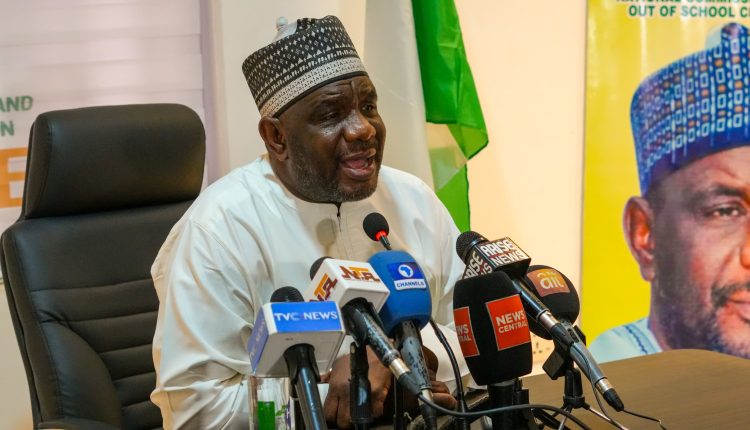Commission awaits states’ action on enrolment of 700,000 out-of-school children
The National Commission for Almajiri and Out-of-School Children Education (NCAOOSCE), says the Commission is still awaiting action from state governments to collaborate in the enrolment of 700,000 out-of-school children mapped across the country.
The Executive Secretary, Dr Muhammad Idris, while fielding questions from journalists in Abuja said the Commission had formally written to all 36 state governors and the Federal Capital Territory (FCT) for the enrolment of out-of-schoolchildren. .
He emphasised that the Commission had successfully embarked on an unprecedented nationwide mapping exercise, documentation, and reaching remote communities to identify out-of-school children.
He expressed concern that the data gathered showed that poverty remained the leading cause of children staying out of school, while the inability to afford basic needs such as uniforms and PTA levies also contributed significantly.
Idris explained that the Commission was ready to submit the data of the 700,000 mapped children for enrolment as soon as states take the necessary steps to begin implementation.
He also disclosed that the Commission will, within the next three months, provide states with an updated database of an additional 3 million out-of-school children, once the current number had been enrolled.
He reaffirmed that the assignment was in line with the directive of President Bola Tinubu, who had mandated that Nigeria must eliminate the challenge of out-of-school children before the end of his tenure.
“The president was pressing on us that before the end of his 8 years, no Nigerian child should be out-of-school.
“And I just told you that I can make the number 3 million in the next 3 months only if I have someone that is ready to take them to school.
“And because the federal government cannot open schools across all the states, it has to be done by the states.
“I know that state governors are working hard to revitalise education in their states. And they are doing all that is required. But what we are saying is, let there be partnership,” he said.
Idris also welcomed the approval of the National Policy on Almajiri Education by the National Council on Education.
He noted that the approval affirmed the Almajiri child as a full-fledged pupil deserving of the same rights, resources, and learning environment as any child in a conventional school.
Providing updates on ongoing interventions, he revealed that at the Tinubu Legacy Skills Training Institute in Kaduna, about 200 Almajiri learners had completed a nine-month intensive programme.
The training, he said, equipped them with English and Arabic language proficiency, Qur’anic interpretation skills, and qualification through the NBAIS examination for admission into higher institutions.
“Actually, the number of enrolment in the Tinubu Legacy Skills Training Institute in Kaduna is 200. It was a 9-month training programme, and we were able to successfully accomplish this 9- month programme.
“I want to share with you that they were allowed to attempt National Board for Arabic and Islamic Studies examination, and very soon they will be certified by MBIAS, and they can continue their education in Nigerian universities and universities outside the country.
“We were able to meet authorities in Saudi Arabia. We discussed with them and they are ready to offer scholarships to those students that graduated.
“We were also in contact with the Malaysian Embassy, and we received a letter of invitation from the authorities in Malaysia. Malaysian officials are also ready to give scholarships to those children,” he said.
He added that the learners also acquired vocational skills in POP installation, CCTV installation and maintenance, solar installation and maintenance, tiling, GSM repairs, agriculture, and ICT, where some have already become highly skilled web designers.
Similarly, he said in Ibadan, Oyo State, another 150 out-of-school girls were undergoing training in a wide range of vocational areas.
This areas, he said, includes: fashion designing, cosmetology, hair-making, makeup, leather works, production of school bags and souvenirs, shoemaking, handbag production, events and catering services, preparation of local and international dishes, and event planning.
Additionally, he said the girls were also being exposed to the Accelerated Basic Education Programme (ABEP) to support their reintegration into formal education.
Idris added that the Commission had established 106 learning centres across the country, where out-of-school children were being taught literacy and numeracy skills, while Almajiri learners were exposed to the curriculum.
He called for stronger commitment and cooperation from all stakeholders, stressing that the success of the national effort to reform the Almajiri system and reduce out-of-school numbers depended heavily on support from all.(NAN)



Comments are closed, but trackbacks and pingbacks are open.